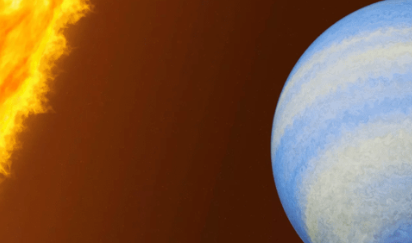Another planet, and more mysteries we are looking to answer.
Situated 64 light-years away, the exoplanet HD 189733 b presents a landscape far removed from the serene blues of Earth. This Jupiter-sized planet, discovered in 2005, offers a stark contrast with its lethal weather conditions, including winds that surpass 5,400 miles per hour and a peculiar precipitation of glass rain. Researchers have recently unveiled that this distant world not only exhibits extreme weather but also carries the foul odor of rotten eggs due to trace amounts of hydrogen sulfide in its atmosphere.
‘Nightmare world’: Jupiter-sized planet, which is 64 light-years from Earth, reeks of rotten eggs – Times of India
HD 189733 b, an exoplanet located 64 light-years from Earth, has been found to have an atmosphere…#Science @qnewshub @qnewscrunchhttps://t.co/V7fB00rQwU
— QNewsHub (@qnewshub) July 10, 2024
HD 189733 b belongs to a class of exoplanets known as “hot Jupiters,” gas giants that orbit their stars with scorchingly close proximity, resulting in infernal surface temperatures. For HD 189733 b, this proximity translates to a blistering surface temperature of around 1,700 degrees Fahrenheit. Its rapid orbit around its star takes merely 2.2 days, a stark contrast to our own Jupiter’s 12-year solar orbit.
NASA has often described HD 189733 b as a “nightmare world,” a planet that, while appearing a beautiful bright blue from afar, harbors a deadly environment. This deceptively welcoming hue masks a world where the sky rains glass sideways, capable of shredding any matter unlucky enough to be exposed to its tempestuous atmosphere.
The recent study utilizing the James Webb Space Telescope has shed light on the atmospheric peculiarities of HD 189733 b, highlighting the presence of hydrogen sulfide. This discovery is pivotal as it provides insights into the atmospheric composition of gas giants outside our solar system and helps scientists understand the processes that form such planets. According to Guangwei Fu, an astrophysicist at Johns Hopkins University who spearheaded the research, while the planet is far too hostile for life as we know it, studying these elements offers a foundational step towards understanding more complex planetary ecosystems.
Wissenschaftler haben festgestellt, dass der Exoplanet HD 189733 b nach faulen Eiern stinkt. 🥚 https://t.co/FgljViIryJ
— PC Games Hardware (@PCGH_Redaktion) July 10, 2024
Fu’s research is part of a broader effort to map and understand the atmospheric conditions of exoplanets. By tracking elements like sulfur, scientists hope to unravel the mysteries of planet formation and composition across the universe. This knowledge could illuminate the origins and migration patterns of these massive planets, which often vary greatly from the characteristics of planets within our own solar system.
NASA’s characterization of HD 189733 b underscores the violent and volatile nature of some celestial bodies. As researchers continue to probe the atmospheres of these distant worlds, each finding adds a piece to the puzzle of our cosmic neighborhood. The study of planets like HD 189733 b not only expands our understanding of planetary science but also places into perspective the tranquil stability of Earth, making us all the more aware of the rarity and preciousness of life-sustaining conditions.
Key Points;
i. HD 189733 b is a Jupiter-sized exoplanet 64 light-years away, characterized by extreme weather including 5,400 mph winds and glass rain.
ii. The planet’s close orbit to its star results in a surface temperature of approximately 1,700 degrees Fahrenheit, classifying it as a “hot Jupiter.”
iii. Its atmosphere contains hydrogen sulfide, contributing to a smell of rotten eggs and providing insights into the atmospheric chemistry of distant gas giants.
iv. Researchers use the James Webb Space Telescope to study HD 189733 b, aiming to understand the formation and composition of such hostile planets.
v. The findings from HD 189733 b help scientists explore planetary formation theories and the potential for other gas giants in the universe.
RM Tomi – Reprinted with permission of Whatfinger News



